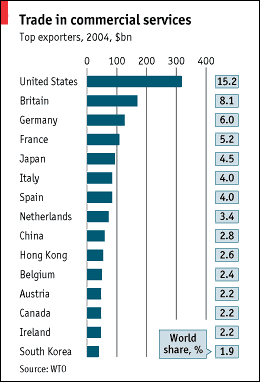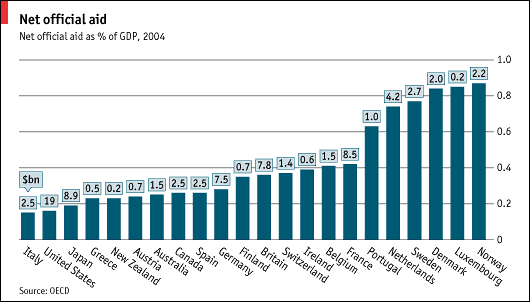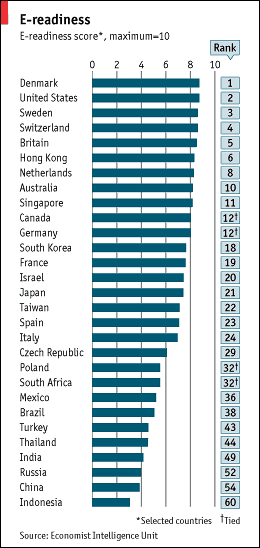Info From The Economist
There are a number of what I think are good reasons for perusing The Economist. First, it's not an American publication, therefore it tends to give a very different perspective than what you find in the standard American press. Second, it's very well-written, and with a dash of British humor to it that makes one wonder how such a serious sort of people can be so bitingly funny --- unlike most serious publications, though, The Economist allows the humor of its writers to come through. And lastly, it's from a conservative perspective, but then that's European conservative and I'm still trying to figure out what that means if the truth be told. Anyway, it supports big business in a way that I'm not always comfortable with, but it's always very logical in its support (well, it generally seems to be.) Ok, that said, let's get to the point.
I'll likely share on occasion tidbits I've found in the magazine, and today is one of those days for sharing. The following content comes from the May 7th - 13th edition of the paper (the Brits prefer to call it a paper, vice how we Americans, or at least I, would call it a magazine.) So enjoy as you can, and be aware that most of the magazine's content is readily accessible atThe Economist.
Trade
I don't suspect that the U.S. position in this chart comes as any great surprise. Of course many of those immediately below us in the export business are exporting their stuff to us, adding to our $691 billion trade deficit.
Foreign Aid
From The Economist:
Aid increased by 4.6% in real terms last year, reaching a record $78.6 billion, according to the OECD.Norway is the most generous donor to poor countries, parting with 0.9% of its GDP last year. The United States gives the most in absolute terms, providing $19 billion-worth of aid last year. But of the 22 members of the OECD's donor committee, only Italy gives less than America as a proportion of its annual income.
Of course it's very hard not to look at this chart, then the one before it, and wonder how we justify this. By any measure we have the most, and by virtue of how much of what we have that we actually share we're pretty close to being the Ebenezer Scrooge of the world. Good luck Tiny Tim.
E-Readiness
From The Economist:
Denmark is still the best place in the world to do e-business, reports the Economist Intelligence Unit, a sister firm of The Economist. It has ranked the “e-readiness” of the world's 65 largest economies to find the countries most amenable to internet-based business. The factors considered include broadband and mobile-phone penetration, as well as government regulation. America rose from sixth to second place in the ranking since last year. Britain fell from second to fifth place. India, despite being an IT superpower, is ranked only 49th.
I doubt that many people in the U.S. would be surprised that the U.S. is in the top ten of those best prepared for using the Internet, but I'd also bet many are surprised we're not number one. Frankly I'm surprised that the Danes top the list, with two Nordic countries immediately following and a third some 6 places below --- what's going on there?




2 Comments:
The foreign aid is 'official'. I wonder how total donations from Americans would compare? Or maybe I'm feeling stung because I just sent a check to one organization and am searching for 8 more ~ and I know I'm not the only one who donates directly to organizations rather than expecting the government to do so ~ I certainly don't always support their preferences!
I brought a copy of The Economist back from a recent flight. It had an article about the flat tax, something no one has convinced me is a bad thing. Interesting read!
~waxwing
Waxwing, You're right it's addressing "official" aid and to be honest I've never seen anything that addresses "private" aid. Off the top I'm inclined to think that how much of a giver a government is reflects how much of a giver the average citizen is, but I have nothing to prove that. I'm also of a mind with you regarding supporting certain organizations, but then on the whole the ones I support that are external to us tend to only get money when there's a crisis, in which case we're talking about the Red Cross. I see a governmental responsibility here inasmuch as most would agree that poverty is not a good thing, and encouraging development works well for everyone, and the largest, surest revenue streams would be expected to come from governments. If we're really interested in making the world a better and more livable space then I think we can't expect to depend on individuals to dig into their pockets.
Post a Comment
<< Home